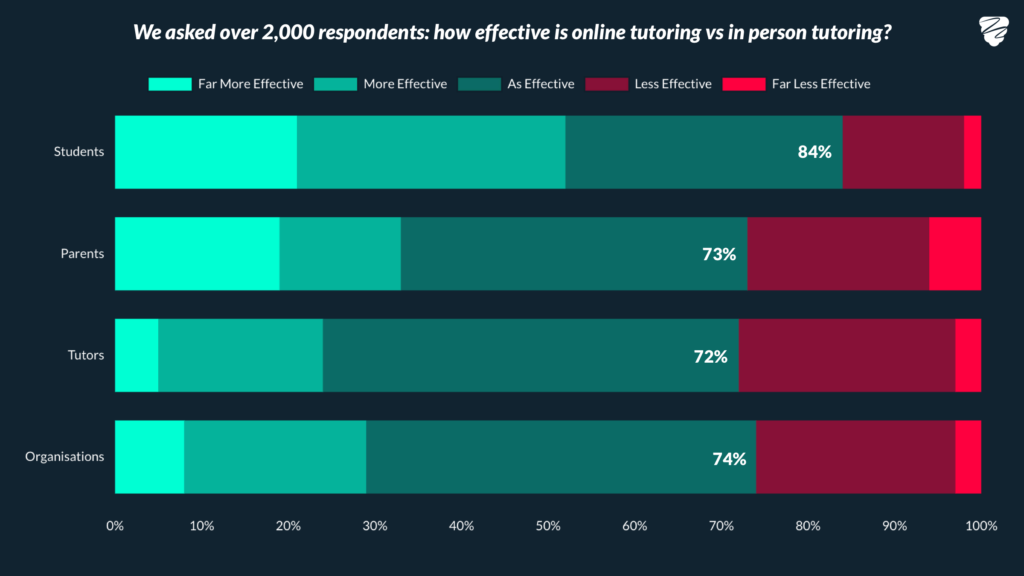
When our world was pulled inside out in March online learning took a huge leap forwards. By carrying the burden of teaching and learning for the entire nation at short notice online learning platforms made it possible for hundreds of thousands of hours of live teaching and learning to continue throughout lockdown.
Revolutionary is a word often overused and abused when it comes to educational change. Not this time. The switch from traditional teaching to online has been genuinely transformational because it has drastically altered attitudes.
Live online learning is now an important player, and this will surely be the case for the next few years, as we learn to cope in a world that is moulded and constricted by covid-related risk.
The government seems to agree, pledging enormous sums of money to the National Tutoring Programme, which will use tutoring charities and organisations to help primary and secondary pupils catch up on lost learning through one-to-one and small group tuition – much of which will be delivered online.
Survey data certainly reinforces our belief that dramatic, revolutionary change has occurred in attitudes to live online learning.
In June we carried out our first survey into online learning attitudes. It was the biggest survey of its kind to date and involved responses from more than 2,000 users of our live online teaching platform, Bramble. Almost half of those respondents were tutors with the remainder consisting of students, parents and tuition organisations.
Full-time classroom teachers made up 17% of all tutor responses. The vast majority (91%) expected at least some of their classroom teaching to remain online over the next 12 months, while 87% expected live online teaching platforms like Bramble to have a role in supporting classroom teaching over the next 12 months.
Students responded along similar lines. Interestingly, the online approach is preferred by students over more traditional in person tutoring – 84% of the students who took part in the survey said that online tutoring was more effective or as effective as tutoring in person.

Three quarters of parents and tutors agree, although the responses of tutors in particular were weighted more towards online tutoring being as effective as the in person alternative.
We asked the various parties to choose the three main benefits of online tutoring for students. They all agreed that flexible lesson scheduling, searchable lesson recordings and a more relaxed and focused atmosphere were the primary benefits.
The extra functionality provided by online platforms like Bramble are proving a popular aid to learning – 73% of students said they planned to use the searchable lesson recording function provided by the platform for learning and revision over the next year.
Many respondents felt that searchable lesson recordings perform a dual purpose – they also help to keep tutors and students safe. Additionally, a number of students and tutors noted that they covered more content in their online lessons than they did in person.
When asked what proportion of their child’s tutoring will be online over the next 12 months, 95% of parents believed that some or all would stay online – a figure which rises to 98% when put to students.
This figure is a dramatic contrast to pre-coronavirus tutoring. Most parents (84%) said all tutoring before the pandemic was in person, with just 6% saying that half or more was online.
The shift is even more pronounced for tutors. Virtually every tutor (99%) said at least some of their tutoring work will be online over the next year, with 86% saying that at least half will be online. More than a third said that all their tutoring would be online over the next 12 months. Before lockdown, 80% of those tutors had never taught online.
These results show that the shift from in person to online tutoring is not just for the lockdown. They also dispel the myth that online tutoring is inferior.
Online tutoring is now the most likely way tutors will teach their students for at least the next 12 months, and likely much further beyond that.
It’s a dramatic change driven by necessity but there is now a widespread realisation amongst students as well as tutors and parents that tutoring online is just as effective – and for many even more effective – than the in-person approach that was so prevalent just a short time ago.
About Bramble
Bramble was launched by London-based start-up Bramble Technologies in 2016. It is designed for live online tutoring in one-to-one and small group settings. It also supports whole class teaching. It includes features not found on mainstream video conferencing solutions.
A key feature of the Bramble platform is that lesson recording is augmented with artificial intelligence which turns words spoken by teacher and student into accurate transcripts, while optical character recognition software transcribes any resources and text annotations.
Students can then search their lesson recordings using Bramble’s Smart Search technology, which helps them quickly zero in on whatever concept they wish to revisit.
Lessons are focused on a highly interactive shared whiteboard accompanied by a range of pen and text tools to draw diagrams and add annotations.
Bramble Broadcast runs on the company’s own data infrastructure and uses less bandwidth than standard video conferencing platforms. This means that students from households with poor internet connections can access online teaching with minimal disruption – helping to address a major concern of schools serving the most deprived areas. Students do not have to download any software and simply join lessons with a single click.
Bramble was made freely available to tutors and teachers worldwide in early March as the lockdown loomed. In the second quarter of 2020 it has hosted more than 260,000 hours of live teaching and learning in 114 countries – 28 times greater usage compared to the same period last year.
A role for online learning? Teachers give their views
Many of the 200+ full-time teachers who responded to our survey offered their reflections on the role that online learning platforms like Bramble could play in supporting teaching and learning.
Here’s a selection of those perspectives:
“As a peripatetic teacher, even when the children are back in school, I may not be as my job would be classed as quite high risk – normally visiting lots of different schools and children in any one day….I’ll be able to arrange with schools and SENCOs to still ‘see’ and teach my students – even if they were in school, but I couldn’t be.”
“If blended learning is going to be the short-term approach, then I think online teaching platforms would provide teachers with a means of providing one to one support, especially for students who have found it hardest to engage in online learning during lockdown.”
“Online platforms could help teachers and pupils to change the way they learn – for example, students who don’t like the hustle and bustle of the classroom could continue to take part in quality lessons but in an environment more conducive to their own needs. These platforms could also be used to minimise supply cover costs having children able to access lessons at different times.”
“I tutor pupils in the LAC system and who are unable to access mainstream education as a result of exclusion. Bramble could be used to afford some level of inclusion, albeit from a distance.”
“I’m looking at a scenario where I will be back in school in my classroom with a small number of students in front of me who find it harder to work at home, and the rest of class will be logged on through Bramble, which will allow every student to see the full lesson and interact with me in the same way, whether they are in the classroom or at home. And because the lesson is recorded students can then access that lesson later for revision.”
Next steps:
A full breakdown of the Bramble online learning survey results are available at https://about.bramble.io/blog/news-online-tutoring-beats-in-person.html
About the author
Will Chambers is co-founder of Bramble, an online tutoring and teaching platform designed for education. Bramble is currently used by over 49,000 tutors and students in 148 countries. The experience and knowledge gained from more than 400,000 hours of live online teaching has given Bramble a unique insight into how people teach and learn online.
Register for free
No Credit Card required
- Register for free
- Free TeachingTimes Report every month